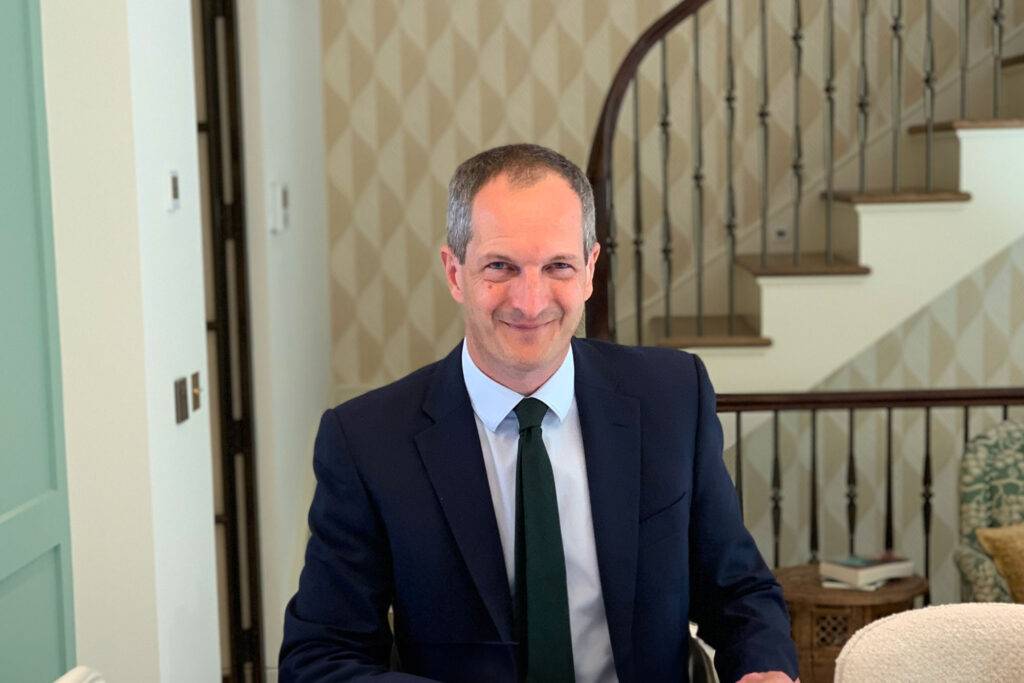Key findings
1. The public matter as a policy audience – and they expect policy experts to be more proactive
2. If we want to improve public debate, we need to look beyond fact-based communications alone
3. We need to maintain policy influencers’ licence to operate
This data relates to the US only. You can see the UK version here.
Introduction
2018 was a good time to be a populist. The year was marked by the continuing march of this movement worldwide.
The rise of the gilets jaunes in France. The election of Bolsonaro in Brazil. The Five Star Movement and the Northern League in Italy. The continuing assault on democracy in Hungary and in Poland.
The never-ending Brexit saga in the UK, compounded by struggles for the soul of the two main parties (Conservatives and Labour), and the creation of two new parties (Brexit party and Change UK).
In the US, discussions around immigration are highly emotional, alongside issues like trade wars and protectionism, international relations, healthcare, and climate change.
Donald Trump’s leadership has been disruptive to the political system. The government shutdown beginning in December last year was the longest ever, at 34 days.
President Trump also holds the record for the highest White House staff turnover, which has made work more difficult for policymakers. No-one seems to have a clear vision of the way forward – but what is becoming painfully evident is that the status quo is no longer an option.
We went to Pittsburgh to get a glimpse of the public’s take on the current state of play.
The changes in our politics and in society have prompted think tankers to reflect on their role in the 21st century. Not least of whom Robin Niblett of Chatham House, who suggested international think tanks should be more proactive in promoting the principles they believe in.
Those of you familiar with our work will know that we believe the rise of social media has irrevocably shifted the policymaking dynamic. It has turned the public into an active player that must be taken into account.
Add to this a probing media, and the backdrop of a new socio-political cycle coupled with a technological revolution – and the scale of the challenge emerges. In this new fluid landscape, what can the public tell us about the role for the modern think tank?
This year’s research sought to explore a number of questions to help our understanding of the political and societal environment within which policy experts operate.
- What are the public’s expectations of policy experts?
- How can policy experts be more effective communicators?
- How have recent events affected public perceptions of accountability?
What we found
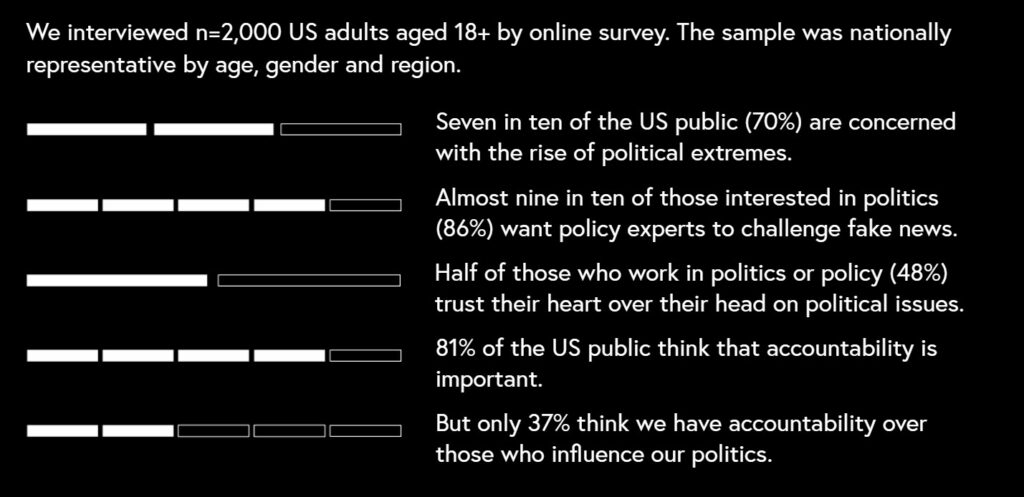
A more proactive role for policy experts
The public want experts to challenge fake news and help them make sense of current affairs. Those that are afraid of the rise of political extremes are the most likely to want to see that expert engagement.
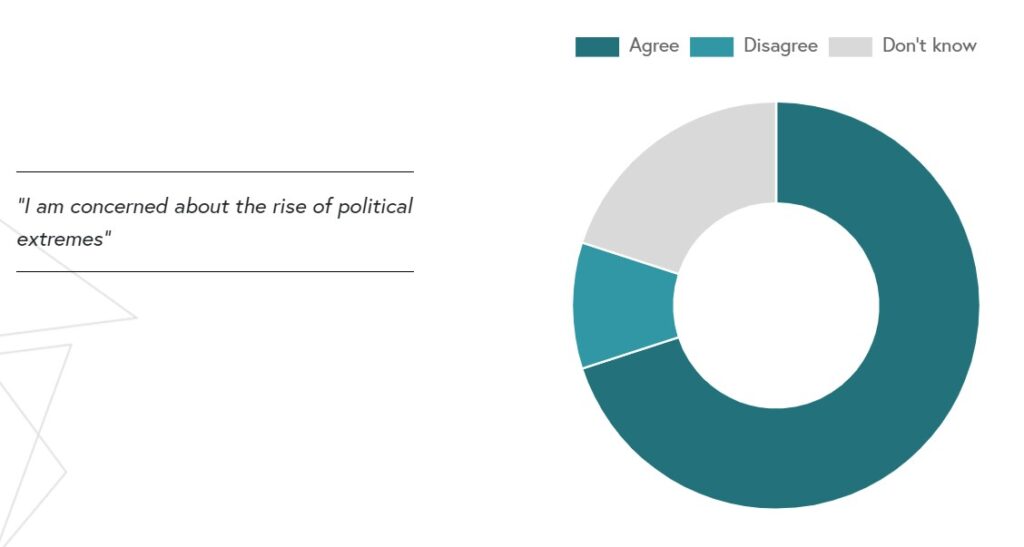
Our research shows that 70% of the US public is concerned about the rise of political extremes. This is true across all segments of the population, but most pronounced among the politically engaged, those with university degrees, and those approaching retirement.
Crucially, these same segments are also those most likely to want to see policy experts challenge news stories that are not true. Over two-thirds of the US population want experts to challenge fake news, rising to four-fifths among degree holders, and almost nine in ten among those interested in politics.
Beyond standing up to fake news, respondents want policy experts to engage with them. Half of the US public wants experts to help them understand current affairs issues, rising higher among people interested in politics and activists.
The limits of self-reflection
If we truly want to encourage an informed public debate, we need to recognise the American public as they are – not how they “should” be.
The reality is that we, the public, are not good at recognising our own shortcomings.
Last year, Cast From Clay’s research explored if the US public felt people needed to understand government policy better. 72% agreed. This year, we tested whether they were including themselves in this assessment.
We found that half thought they had a good understanding of government policy. Tellingly, those who work in the policy or political realm were least likely to claim they had a good understanding of government policy.
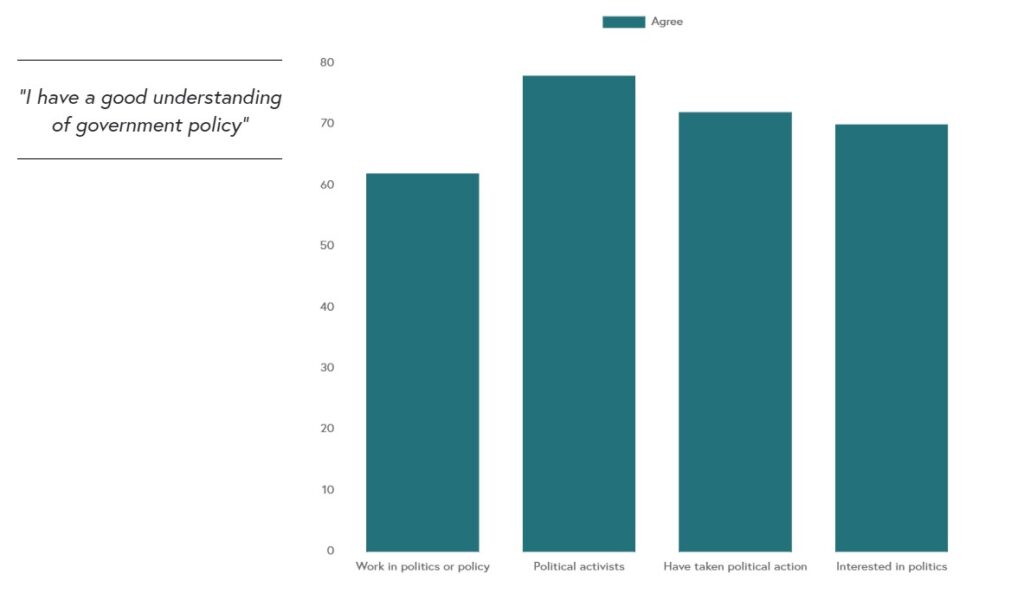
This looks to be an example of the Dunning-Kruger effect, a cognitive bias where those who know the least over-estimate their own ability, while those who know the most under-estimate their competence.
The challenges of perceived knowledge are well-documented. Bobby Duffy and Ipsos Mori’s Perils of Perception research explores this issue in detail. They found that when challenged about immigration statistics, many respondents simply rejected the official figures if they didn’t fit their world view.
Those familiar with cognitive science will not be surprised.
This truth about the public is equally true of policy makers. If policy experts want to encourage an informed public debate, we need to recognise the role of cognitive bias.
Cognitive gaps cannot be addressed by simply presenting facts. We need to frame the issues.
The limits of reason
We need to reconsider the premise of our communications: the notion of the rational citizen who ingests complex arguments and formulates political opinions accordingly.
Tellingly, this is not just true of the general public. We found that the closer respondents were to the heart of politics, the more they reported that emotion played a role in shaping their political views.
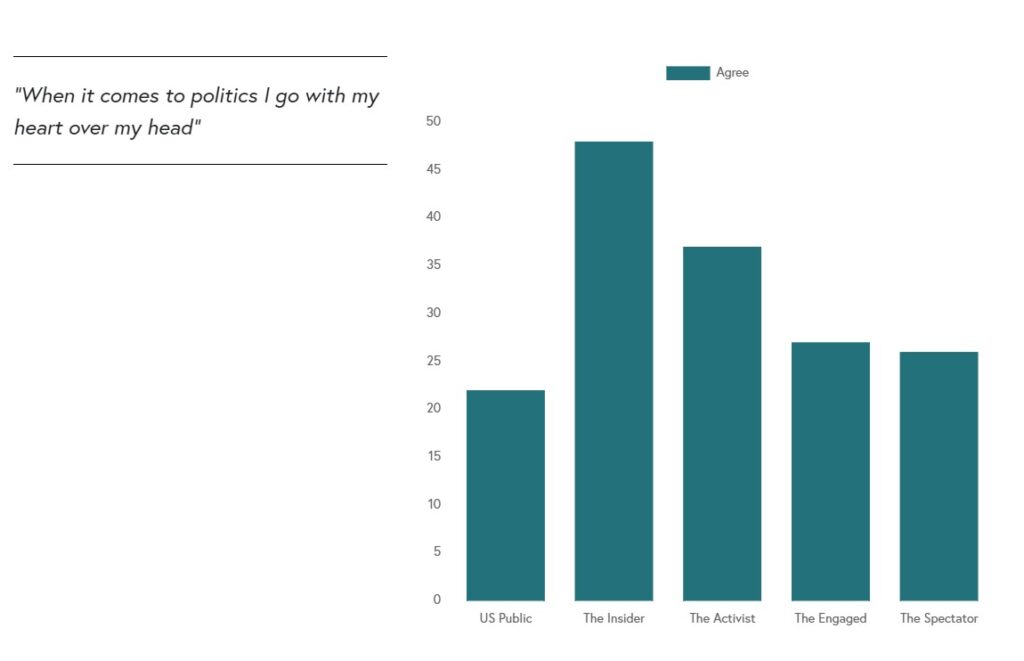
What may seem at first to be a surprising admission of emotional honesty by political and policy professionals, may simply be evidence of heightened self-awareness. The public are almost certainly as prone to emotion as those who work in politics or policy.
In communicating policy, think tanks need to recognise the limits of the traditional approach – ie presenting facts and statistics, hoping they will speak for themselves.
In highlighting these limits, we are not making the case for bleeding-heart communications. We are simply making a pragmatic case for the need for the human to find a place in policy communications.
There is no other way to counter the populist monopoly on feeling.
“In politics, when reason and emotion collide, emotion invariably wins.”
Drew Westen
The accountability gap
The need to engage is about more than a sense of moral duty. It should also be about a sense of self-preservation for those who seek to influence policy.
Last year, we explored questions around trust in think tanks. Barely one in five people interested in politics reported trusting what think tanks have to say, while two in five believed think tanks had the interests of the elite at heart. Among those who work in politics or policy, it was two in three. In other words, the state of play isn’t great.
This year we explored the question of accountability. We recognize that not all think tanks see themselves as influencers of policy. When it comes to public trust, it is perception that counts.
While eight in ten Americans think organizations who influence government need to be accountable, fewer than four in ten think this accountability is a reality. A 44-point gap. Among those interested in politics, the gap rises to 52 points.
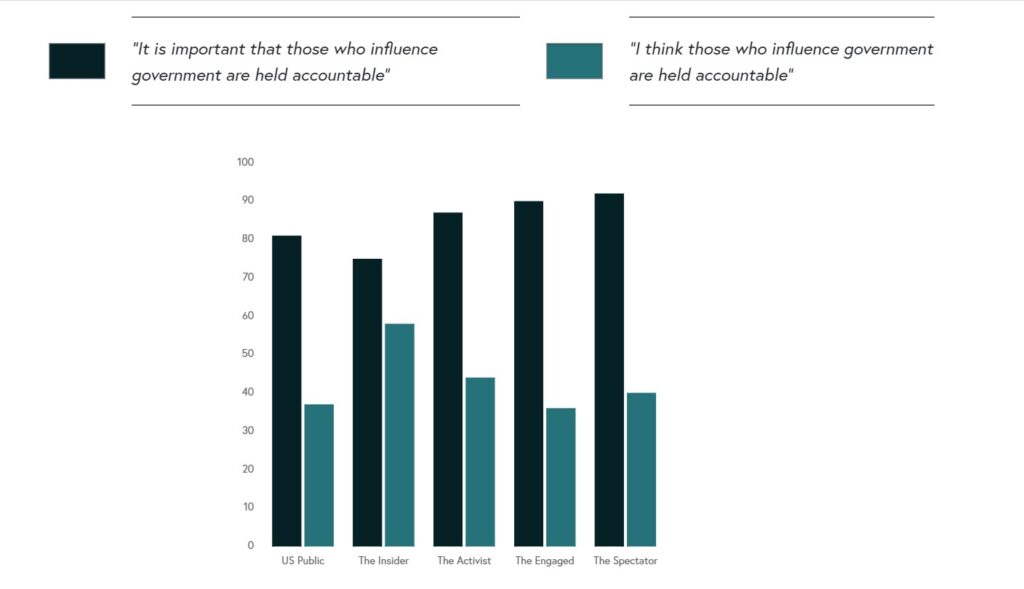
A different story emerges for those who work in politics and policy. They are less likely to place importance on accountability, and much more likely to say that political influencers are being held accountable.
Those who work in politics or policy significantly under-estimate the public angst around accountability. This gap in perception must be food for thought for those whose business it is to engage with policy makers.
Think tanks have increasingly found themselves under the media spotlight, and the public outrage about funding from foreign countries or working too closely with corporates shows the appetite for transparency and propriety among the public.
Society does not write a blank cheque. Organizations need to earn the right to do what they do: they need a metaphorical licence to operate. Especially when it comes to influencing power.
Examples abound where organizations and industries have lost their licence to operate – factory farming, Amazon HQ, Starbucks, Chicago police, to name but a few. Others like tech companies and the plastics industry are feeling the heat.
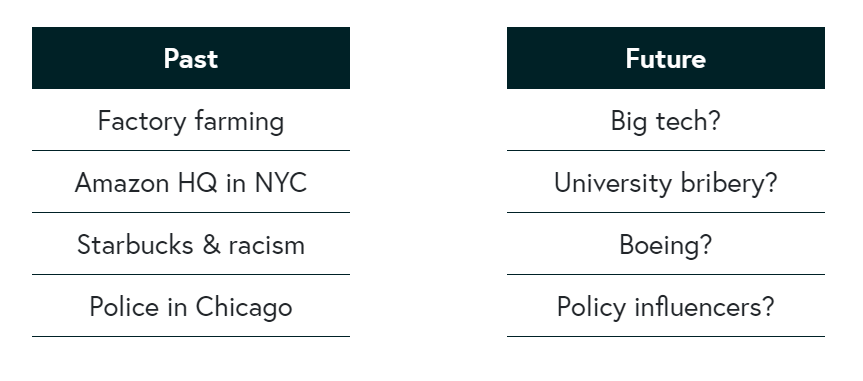
Policy influencers are not at crisis point yet, but the warning lights are starting to flash.
Think tanks’ position as idea generators is not a given
There is no single unanimously trusted source of policy ideas across any of the groups we tested. That much is clear.
Among the American public, think tanks come some way below local community organizations and academia as trusted sources of policy ideas. And think tanks are neck-and-neck with online movements and religious institutions.
Perhaps most worrying for think tanks is that people who work in politics or policy are just as likely to trust them to come up with ideas to improve the country as political parties. The business of ideas is close to being trumped by the political entities it is intended to support.
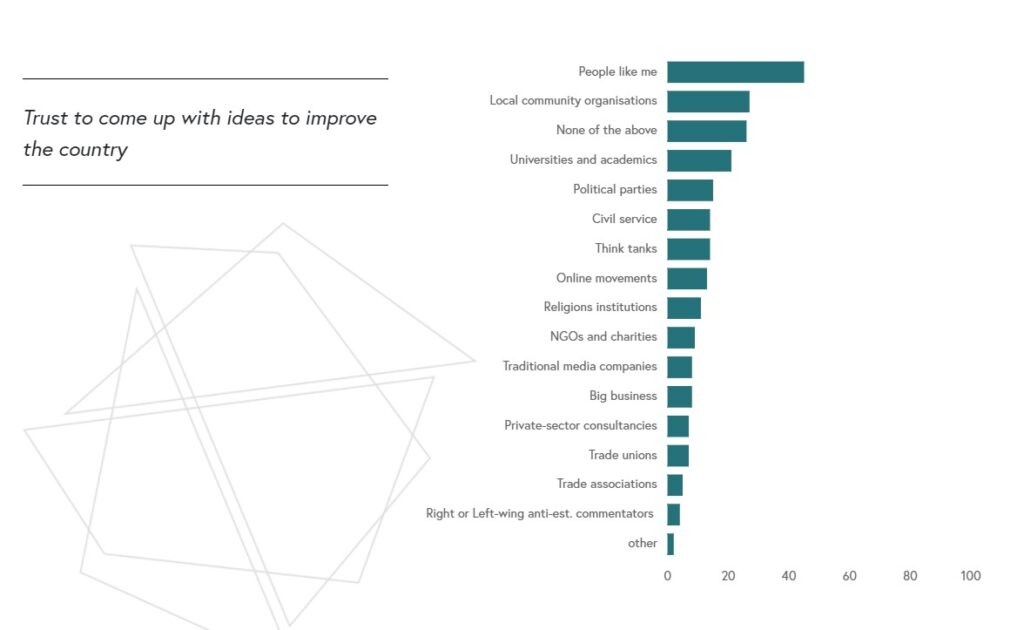
The lack of trust in institutions to come up with ideas has left the field wide open. And in that space “people like me” dominate. In every segment, this popular feeling is present – and it is perhaps no surprise that populist organizations play to this feeling.
Among insiders – those that work in politics and policy – the story is barely different, with trust of think tanks at less than 20%. No-one is implicitly trusted to come up with ideas for a better America.
Policy experts as conversation starters
Our findings on how people like to receive political or policy ideas offers an interesting twist on what engagement could come to mean.
This year’s research explored the formats which people engage with most, in the context of political or policy ideas. Out of the twenty formats tested – which included PDF reports, events, mainstream news, social media and infographics among others – the top five were perhaps unsurprising.
Mainstream news retained a place at the top table, though there was a marked difference between online and print – the latter on a downward trend, the former more stable. Documentaries were also a popular format.
Most notable, however, was the prominence of conversations with friends and social media. And the clear preference for social media among younger audiences foreshadowed what policy communication could look like in 5-10 years’ time.
The question is this: in a world where people prefer talking things through with people they trust, how do we rethink what engagement means?
Rather than playing a paternalistic role of bestowing knowledge on the public, could think tanks have more of a role as convenors? Generating ideas, framing the debate, and then orchestrating an informed public dialogue.
The public wants policy experts to speak out and engage. But they need to speak in a way that resonates with humans – public and policy makers alike – with all their foibles.
Yes, policy experts will win the intellectual argument all day long, based on their vast bank of facts and statistics. But if their facts challenge an individual’s pre-existing frames – be they policy maker or public – the facts will be dismissed almost every time.
This tension lies at the heart of the frustration that is driving populism – a gut-feel that the facts and statistics are not reflecting people’s own lived experience.
If Pittsburgh is anything to go by, the human experience needs to have a voice.
1. The public matter as a policy audience – and they expect policy experts to be more proactive
What role is there for think tanks?
2. If we want to improve public debate, we need to look beyond fact-based communications alone
How can think tanks tap into the human?
3. We need to maintain policy influencers’ licence to operate
What are the risks for think tanks?
We’ve presented the full findings to communicators and researchers at policy organisations such as the Atlantic Council, the Brookings Institution, the Heritage Foundation, and the Stimson Center. Get in touch with Tom Hashemi if you’d like to arrange a complimentary presentation of the full results.
We would like to thank the many individuals who have supported us – including challenging our thinking – over the past few years. Special mentions to Andrew Marshall, Benedict McAleenan, Clara Widdison, David Wastell, Emily Duncan, Enrique Mendizabal, Helen Dempster, Joe Miller, John Schwartz, Joseph Barnsley, Laura McDonald, and Madeleine Burns. Credits to Brandon Roudebush, Josh Eyre, Katie Mihailovits, Katy Murray, Max Greenstein, Tim Moots, and Vitaliy Yaruta





